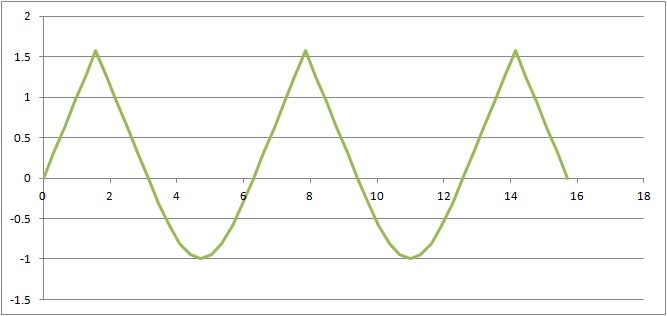Integral to the Maximum
∫ 0 2 n π max ( sin x , sin − 1 ( sin x ) ) d x = ?
Note that n is an integer.
To try more such problems click here .
This section requires Javascript.
You are seeing this because something didn't load right. We suggest you, (a) try
refreshing the page, (b) enabling javascript if it is disabled on your browser and,
finally, (c)
loading the
non-javascript version of this page
. We're sorry about the hassle.
2 solutions
Moderator note:
Sketching out the graph certainly helps visualize the question. Great job!
Same method with Harshvardhan Mehta better graph and maybe simpler calculations.

We note that for each cycle ( 2 π ) , there is a positive triangle and a negative sine curve. Therefore,
∫ 0 2 n π max ( sin x , sin − 1 ( sin x ) ) d x = n ( 2 ∫ 0 2 π x d x − 2 ∫ 0 2 π sin x d x ) = 2 n ( [ 2 1 x 2 ] 0 2 π + [ cos x ] 0 2 π ) = 2 n ( 8 π 2 − 1 ) = 4 n ( π 2 − 8 )
I = ∫ 0 2 n π m a x ( s i n x , s i n − 1 ( s i n x ) ) d x
= n [ ∫ 0 2 π x d x + ∫ 2 π π ( π − x ) d x + ∫ π 2 π ( s i n x ) d x ]
= n [ 8 π 2 + 2 π 2 − 2 1 ( π 2 − 4 π 2 ) − 2 ]
= n [ 8 π 2 + 2 π 2 − 8 3 π 2 − 2 ]
= 4 n ( π 2 − 8 )